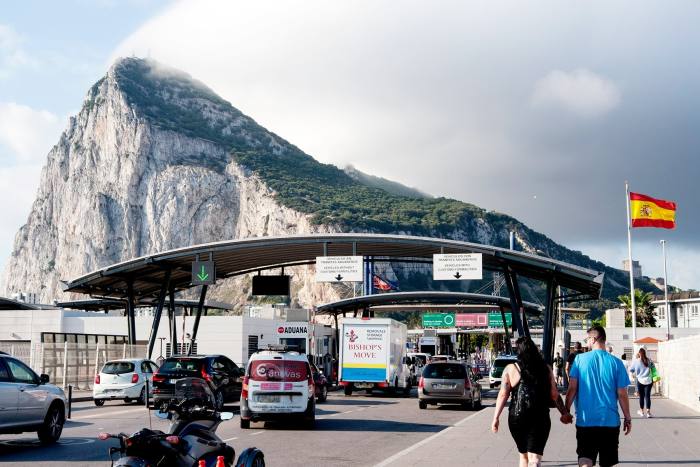Receive free Global Economy updates
We’ll send you a myFT Daily Digest email rounding up the latest Global Economy news every morning.
Good morning. The world’s top central bank chiefs have signalled their readiness to increase interest rates further and keep them high, as they warned tight labour markets are still pushing up wages and prices.
The heads of the US Federal Reserve, the European Central Bank and the Bank of England warned at a conference in Sintra, Portugal, that more action may be needed to bring inflation down towards targets of about 2 per cent despite some economists’ predictions that further rate rises could trigger a recession or financial crisis.
“Although policy is restrictive, it may not be restrictive enough and it has not been restrictive for long enough,” Fed chair Jay Powell told the much-watched central bankers’ conference.
“The labour market is really pulling the economy,” he added, signalling the Fed could increase interest rates at its next two meetings after pausing this month.
Frederik Ducrozet, an economist at Pictet Wealth Management, said the bankers “seem ready to tolerate a mild recession if that’s the price to pay” to hit their targets.
-
IMF: The fund’s deputy director Gita Gopinath warned the conference that central banks may need to sacrifice their fight against inflation if higher rates triggered a systemic financial crisis. Read Gopinath’s interview with the FT.
-
Italy: Italian prime minister Giorgia Meloni lashed out against the European Central Bank’s repeated interest rate rises, saying its “simplistic” approach to combating inflation was likely to hurt European economies more than help them.
Here’s what else I’m keeping tabs on today:
-
Economic data: The final first-quarter GDP figures are due in the US.
-
United Nations: Member states will vote on the creation of a first-of-its-kind institution to investigate the fate of at least 102,000 people who have disappeared during Syria’s 12-year conflict.
-
Wildfire smoke returns in US: Haze from Canadian wildfires has enveloped the US Midwest, placing three major metropolitan areas among those with the worst air quality globally.
Five more top stories
1. Vladimir Putin has moved to shake up Russia’s security services in the wake of the Wagner group’s failed insurrection, rewarding loyalists with promotions and freezing out figures sympathetic to the paramilitary organisation’s leader Yevgeny Prigozhin. Read more about Putin’s efforts to re-establish control over the security services.
2. The Biden administration is weighing new export controls on chips for artificial intelligence. The update by the US commerce department to sweeping export controls introduced in October could make it harder for companies such as Nvidia and Advanced Micro Devices to sell advanced chips to China.
3. Protests have broken out in several Parisian suburbs after police shot and killed a 17-year-old driver who tried to evade traffic control officers. The incident immediately sparked strong emotions after a video taken by an onlooker was posted on social media. Read the full story.
4. The largest US banks would lose $541bn in a hypothetical doomsday economic scenario but still have more than enough capital to absorb the losses, according to annual stress tests conducted by the Federal Reserve. Read more about the annual Fed stress tests.
5. Sri Lanka’s cabinet has approved a proposal to restructure the bankrupt country’s domestic debts of $42bn, a controversial decision that the government says is necessary to comply with the terms of its IMF bailout. The government has declared holidays until Tuesday in order to prevent a run on banks following the decision.
The Big Read

A power struggle in Spain threatens to dash Gibraltar’s hopes for closer ties with the EU. The UK territory, which voted overwhelmingly against Brexit, is racked by fears of a hard border with its neighbour that would end the ease of movement to which workers have grown accustomed.
We’re also reading and listening to . . .
-
The case for a digital euro: While many harbour concerns over privacy, having a new way to pay throughout the eurozone would definitely help consumers, writes Mairead McGuinness.
-
AI salesbots: Companies are using AI to make more sophisticated sales methods that are potentially exploitative, writes Brooke Masters.
-
Unhedged podcast ????: The FT’s Ethan Wu and Katie Martin give three reasons why Japan’s stock market rally is for real — and a few reasons to worry. Free to listen.
Want more from Unhedged? FT premium subscribers can click here to get the weekday newsletter. Not a premium subscriber? Try Unhedged for free for 90 days.
Chart of the day

Chinese companies are rushing into the country’s energy storage sector, spurred by massive state spending on President Xi Jinping’s plan to achieve energy independence. Goldman Sachs forecasts that battery technologies will be part of a more than $7tn infrastructure investment opportunity through to 2040.
Take a break from the news
What is it about certain pieces of clothing that makes us return to them again and again? These stylish people share their secrets to finding go-to garments that have personal meaning.

Additional contributions by Grace Ramos and Gordon Smith


Comments are closed, but trackbacks and pingbacks are open.